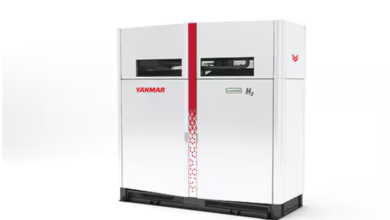Repsol produces renewable hydrogen from biomethane in Spain
Repsol has based its energy transition on energy efficiency, circular economy, renewable hydrogen, and CO2 capture and use technologies.

Repsol has achieved a new milestone by producing renewable hydrogen using biomethane as raw material for the first time.
Repsol has replaced conventional natural gas with 500 MWh of biomethane to produce 10 tonnes of renewable hydrogen at its Cartagena Industrial Complex, Spain. It was used to produce fuels with a low carbon footprint, such as gasoline, diesel, or kerosene for aviation, avoiding around 90 tonnes of CO2. The biomethane was obtained from urban solid waste; thus a great example of the circular economy, transforming waste into high value-added products with a low carbon footprint.
Repsol aims to transform its plants into multi-energy hubs capable of converting waste and other renewable raw materials into products with a low, zero, or even a negative carbon footprint through energy efficiency, the circular economy, renewable hydrogen, and CO2 capture.
Last month, the company produced the first batch of biojet from waste at its Petronor Industrial Complex in Bilbao, Spain. It represents a move forward in decarbonising fuels for air transport, a segment where electrification is not currently viable. The batch consists of 5,300 tonnes of sustainable fuel to avoid the emission of 300 tonnes of CO2, the equivalent of 40 flights between Madrid and Bilbao.
Repsol is promoting the creation of large regional consortiums to promote major industrial projects, such as the Basque Hydrogen Corridor, the Hydrogen Valley in Catalonia, the Hydrogen cluster in Castilla-La Mancha, and the renewable hydrogen hub around the Escombreras Valley in Cartagena.
Repsol also recently announced its first electrolyser in Petronor, with a capacity of 2.5 MW, in 2022. It further plans to start a 10 MW electrolyser in 2024 in the vicinity of Petronor, to serve the synthetic fuels plant that the company will build together with Saudi Aramco. In addition, Repsol plans to construct other electrolysers at Petronor and Cartagena, each with a capacity of 100 MW, to supply its industrial complexes with renewable hydrogen.
Repsol recently announced to start up the first electrolyser, with 2.5 MW capacity at € 8.9 million, in the northern Spanish region of the Basque Country in 2022, to produce renewable hydrogen at its Petronor refinery. Sener and John Cockerill will provide the engineering services while the pipelines transporting the renewable hydrogen produced at Petronor to the Margen Izquierda Technology Park will be constructed by Nortegas. This project is included in the Basque Hydrogen Corridor (BH2C) Initiative, promoted by Petronor and Repsol to accelerate the economic recovery of the Basque Country and Spain
In 2024, a 10 MW electrolyser is scheduled to be commissioned in the port of Bilbao in collaboration with Enagás and the EVE. The hydrogen will be produced with 100% renewable electricity and supplied by Repsol to one of the world’s largest plants for synthetic fuels with zero net emissions.
In 2025, the third electrolyser of 100 MW capacity in the Bilbao area will be commissioned to accelerate Petronor’s decarbonisation process and feed the needs of the Basque Hydrogen Corridor. The company is also planning an additional electrolyser with a capacity of 100 MW at its Cartagena industrial complex, under the Green Hydrogen Platform in Murcia.
